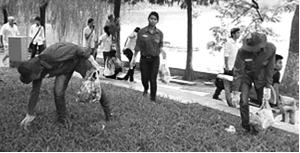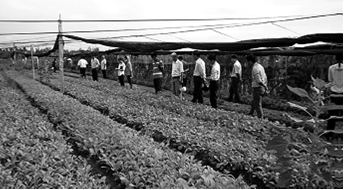

16/08/2017
The rapid industrialization and modernization that Việt Nam has been undergoing have not only generated "hot" economic development for the country, but also affected its natural resources. In addition, an increasing population with growing demand and consumption has consumed and destroyed natural resources more quickly than they are being restored. Human beings with limited knowledge of nature will destabilize the ecosystem and lead the world towards destruction. Therefore, people have started implementing a code of conduct with regard to the environment based on legal and economic rules to exploit natural resources within limits. However, this tool has not proven effective enough. Thus, the issue of environmental and ecological ethics was raised to build a relationship between humans and nature and the environment to create ecological balance and sustainable development.
Changes in notion of environment ethics
In the past, academic textbooks and folktales taught Vietnamese students their country was rich and filled with natural resources. This education instilled in students a sense of pride and love for their country, but it also led to an illusion and dependence on nature and resources. Meanwhile, the Japanese taught the younger generation to be hard-working and creative, use natural resources in an efficient way and protect the environment, because Japan is poor in terms of natural resources and is often affected by natural disasters. From Japan’s lessons, Vietnamese youth are changing their attitude and realizing environment protection is a vital issue for the country. Activities in environment protection have gained the attention of the Government and the Communist Party of Việt Nam. The country’s leaders have issued several documents to educate and disseminate policies to raise awareness among the people and enterprises about using natural resources efficiently and protecting the environment. A lot of environment protection activities have been organized urging the people to participate in creating healthier living conditions.
Develop environmental ethics in different fields
In agriculture, the inappropriate use of toxic chemicals and fertilizers to grow plants and the use of illegal chemicals in animal feed are issues that environmental ethics must address. Producers must follow the "four-rights principle" - right chemical, right dosage, right method and right time - when using pesticides and animal growth stimulants. Producers must mix chemical fertilizers and organic fertilizers in a balanced ratio to avoid polluting the land and water and help symbiotic creatures develop. This way, environmental ethics of farmers will be witnessed through the quality of their products. A product reaches its ecological and environmental value if it is able to protect the health of customers and preserve nature.
In industrial production and trade villages, many producers do not have sustainable production lines. Their production lines discharge toxic waste, such as chemicals, heavy metal and difficult to dispose organic substances, which lead to diseases such as cancer and breathlessness. Some typical reasons for these issues are lead pollution at the lead-recycling trade village in Chỉ Đạo commune, Hưng Yên province’s; pollution of the Thị Vải river caused by Vedan Enterprise Corporation and the fish killed by the waste discharged by Formosa Hatinh Steel Company in the Central region of Việt Nam. These cases prove that there are limits in the implementation of environmental policies and in corporate social responsibility as companies are unaware of the relation between their production and environmental ethics. Therefore, it is necessary to improve corporate social responsibility so that local businesses are made aware of their legal and ethical responsibility to the whole community.
Wastage of electricity, clean water and food also violates environmental ethics. Firstly, consumers must collect and classify the waste at source and implement the 3R (reduce, recycle and reuse) process to minimize environmental pollution. Moreover, consumers and the public can protest against products that are unfriendly to the environment, such as forbidden substances that cannot be used in producing food, growing plants and feeding animals. This will change producers’ environmental ethics resulting in safe, high-quality and valuable products for the community.
 |
|
Vietnamese youths always lead in environmental protection activities |
Some differences between former and current understanding of environment
|
Former understanding |
Current understanding (the Gaia theory) |
|
Unlimited natural resources on Earth |
Limited natural resources on Earth |
|
Search for new resources when the current area runs out of resources |
Prefer recyclable products and natural resources |
|
Living conditions improve mainly on physical conditions |
Physical conditions play a part in people’s living conditions |
|
People must take control of nature |
People must cooperate with nature |
|
Advanced technologies help resolve environmental issues |
Ethics help environmental issues |
|
Wherever people are, there is waste |
Waste is only temporary in the ecosystem, does not exist in the long run |
Recommendations to enhance education of environmental ethics on using and protecting natural resources in a more effective way
Teaching everyone to save natural resources: At school, students should be taught to save electricity and water, protect school property and recycle waste so that they can come up with their own ways of using and spending efficiently.
 |
|
Model of organic vegetable planting contributes to environmental protection and sustainable agriculture development |
Besides this, environmental ethics should be popularized among Government officials at all levels. Local authorities play an important role in educating the local community to protect and preserve natural resources and environment, since they manage the ecosystem of the sea, forest and land in the area.
Developing a new consumption style: The three main factors that can affect sustainability are population, technology and lifestyle. Lifestyle is an element that directly influences the development of society. Lifestyle displays not only the relationship among people, but also between people and nature. In the person-nature relationship, lifestyle exists in the way of consumption. According to statistics, the figure of beer, alcohol and cigarettes produced, imported and consumed is increasing fast compared with the average income of the population. On average, Vietnamese people each year spend 18 trillion VND on cigarettes, twice the country’s total agricultural exports. Therefore, each and every individual in society must reduce consumption to develop a prudent lifestyle, produce no waste and protect nature.
In addition, people need to implement "green shopping" or "ecological shopping," meaning that they should buy and consume environmentally-friendly products. Customers need to consider criteria on environment protection and prices to minimize the effects on their health and environment.
Environmental ethics need to be adjusted by laws and society: Environmental protection must be popularized via public media, such as books, newspapers, radio and television, and promoting people and organizations that either have good or bad effects on environmental protection to develop common environmental ethics. To initiate positive actions on environmental protection, we need to provide people with news and information about the environment and negative activities that damage and destroy environment and human life. Criticism of the public, in many cases, is more powerful than ethical principles and legal regulations. Thus, attracting public attention is a necessary and effective tool to improve people’s awareness about environment protection.
Use of cultural, artistic activities, field trips and local customs and traditions to change people’s behaviors towards natural resources: One of the solutions to enhance environmental protection is to use cultural and artistic activities, field trips, local customs and traditions. Through those activities, people will pay attention to preserving and protecting famous places with valuable ecosystems, including Hạ Long Bay, Cát Bà National Park and Phong Nha - Kẻ Bàng Cave.
Additionally, we need to preserve cultural traditions that could help protect the environment, such as worship of the God of mountain, the God of river and Spring planting.
Prof. Dr. Lê Văn Khoa
The Consultant and Development Institute (CODE)